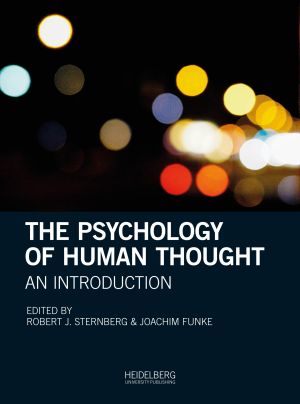Zitationsvorschlag
Evans, Jonathan St. B. T.: Deductive Reasoning, in Sternberg, Robert J. und Funke, Joachim (Hrsg.): The Psychology of Human Thought: An Introduction, Heidelberg: Heidelberg University Publishing, 2019, S. 113–132. https://doi.org/10.17885/heiup.470.c6670
Lizenz (Kapitel)

Dieses Werk steht unter der Lizenz Creative Commons Namensnennung - Weitergabe unter gleichen Bedingungen 4.0 International.
Identifier (Buch)
ISBN 978-3-947732-33-3 (PDF)
ISBN 978-3-947732-34-0 (Softcover)
ISBN 978-3-947732-35-7 (Hardcover)
Veröffentlicht
31.07.2019
Deductive Reasoning
- Deduction was studied originally to assess the classical view that logic is the basis for rational human thinking.
- The traditional deduction paradigm assesses whether people untrained in logic can nevertheless correctly evaluate the validity of deductive inferences. They are instructed to assume some premises are true and to decide if the conclusion necessarily follows.
- Many psychological experiments were conducted in the second half of the twentieth century within this paradigm, most using one of three methods: syllogistic reasoning, conditional inference or the Wason selection task.
- Typical findings from these different methods converged. People make many logical errors, shown systematic biases and are strongly influenced by their beliefs about the problem content.
- People also show a degree of deductive competence. Theories of how this is achieved include the idea that people have built in rules for reasoning – a mental logic – or alternatively that people use mental models to represent logical possibilities.
- Dual-process theories arose from the observation that the logical deductions people make on these tasks often seem to conflict and compete with cognitive biases. These theories propose the operation of rapid, intuitive Type 1 processes as well as slow, reflective Type 2 processes, the latter engaging working memory.
- Individual differences studies show that successful reasoning on laboratory tasks is often related to general intelligence or working memory capacity. People also vary in rational thinking dispositions which makes them more or less likely to engage in high effort reasoning. There is also evidence that people experience a feeling of rightness about the intuitive answers that come easily to mind and that they are less likely check answers by reasoning if this feeling is strong.
- The new paradigm psychology of reasoning has arisen in the past twenty years or so as many psychologists did not accept that illogicality implied irrationality. According to this view, the frequent intrusion of beliefs into laboratory reasoning tasks where they are defined as irrelevant tells us something important about human reasoning. The paradigm assumes that belief-based reasoning is both normal and adaptive in everyday life.






